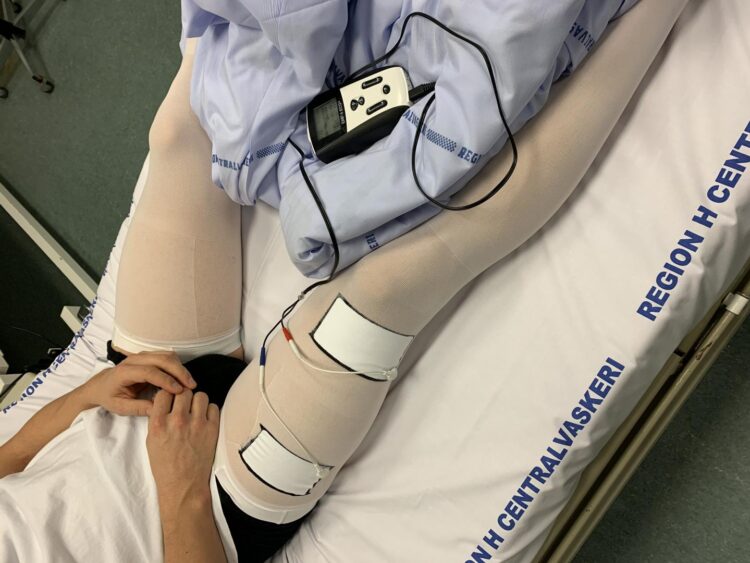Researchers from Aarhus University have developed electronic support stockings and tested them on bed-ridden Covid patients at Copenhagen University Hospitals. Results show that the stockings counteract a significant loss of muscle mass.
A research group from Aarhus University has developed a special biocompatible electrode for electrical muscle stimulation that the group has integrated and 3D-printed onto medical support stockings.
In the winter 2020/2021, the stockings were tested on hospitalised Covid patients. The studies were completed in March, but apart from a case study (Danish Medical Journal) data have not yet been published. However, the project group reveal that the results are very promising.
The stockings were tested on 16 Covid-19 patients who agreed to try the support stocking during their hospitalisation. The participants were hospitalised for five to seven days and were given a support stocking on each leg, but only one of them had the printed electrodes. The leg without electrodes on the support stocking functioned as a control.
“The study demonstrated that these patients lost approximately 10 percent of their muscle mass after just five to six days of hospitalisation. However, with this new technology we’ve been able to counteract the loss,” says Charlotte Suetta, Chief Physician and professor at the University of Copenhagen and head of the clinical trials in the project.
Muscle loss is a serious problem for hospitalised patients, especially patients that need intensive care and are on ventilators for long periods. Recovering from muscle loss after several weeks of total inactivity may take months or years, and some patients will even never recover fully.
There is nothing new about electrical stimulation of muscles, but there are several disadvantages with existing solutions. For example, difficulties in getting electrodes on and off, and skin irritation in the stimulated areas.
“Our invention is much easier to use because the electrodes are an integral part of the textile,” says Shweta Agarwala, who is an expert in printed electronics, and who has been responsible for the electronics part of the setup, which was developed after breakthroughs within printed electronics technology.
The electrodes have three ultra-thin, flexible layers, and these can be printed directly onto different types of material, making it possible to stimulate the muscles through the stocking with minimal irritation.
“And since the electrodes are an integral part of the stockings, they can also tolerate hospitals’ cleaning processes,” continues the assistant professor.
So far, Aarhus University has printed almost 600 support stockings for medical use, and it is likely that the stockings can be used for a far larger group than just Covid patients, including bedridden patients in general, as well as in rehabilitation and for wheelchair users.
###
The project is a collaboration between Aarhus University and Copenhagen University and the research group consists of Assistant Professor Shweta Agarwala, Associate Professor Peter Høgh Mikkelsen and research assistant Youssif Mehri from the Department of Electrical and Computer Technology, and Associate Professor Jens Vinge Nygaard from the Department of Biological and Chemical Engineering at Aarhus University, and Professor, Chief Physician Charlotte Suetta at the Copenhagen University Hospitals, Herlev and Bispebjerg.
The group has received funding from the Novo Nordisk Foundation, the Innovation Fund Denmark and the Lundbeck Foundation.
Media Contact
Shweta Agarwala
[email protected]





